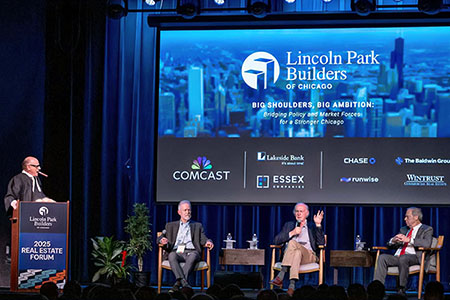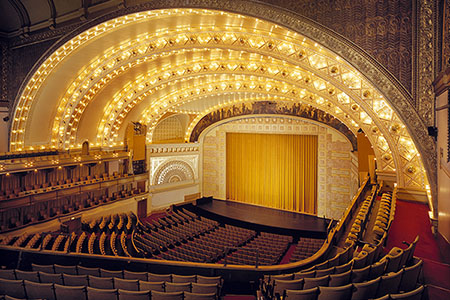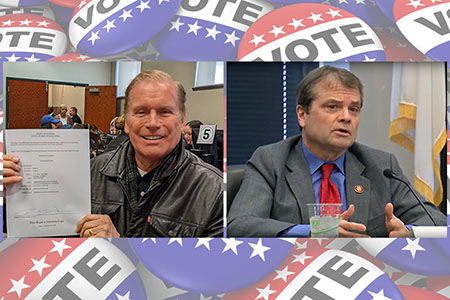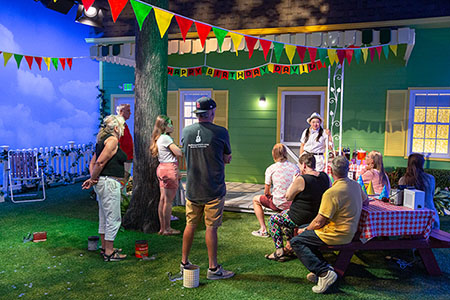Like all the other hotels, Trump International Hotel & Tower has had to weather a stormy economy. But things are looking up at the luxury address. There is always a market for drama. Jul. 1, 2011 – 48-year-old T. Colm O’Callaghan (his middle name is pronounced more like “column” and less like “colm”) started in the hotel business at a 14-room hotel in Killarney, Ireland that was owned by his parents. In the late 1980s, he traded experience working in England, France, and Switzerland for New York, California, and Chicago. He was hotel manager at The Peninsula for three years and general manager of Conrad Chicago for two years. In 2006, he got a call from the Chief Operating Officer of The Trump Organization, a real estate empire based in New York, who was looking for a general manager for the 92-story tower being constructed in Chicago.
The hotel, owned by Trump, goes to the 28th floor. Above that are 486 private residences. “There are many kinds of businesses here,” says O’Callaghan. “There are a lot of moving parts.” Built at a cost of $847 million, the building opened in January 2008, in time for a steep decline in hotel demand. Over at LaSalle Hotel Properties, a publicly traded owner of 36 upscale hotels including Hotel Sax, they were starting to see drops in occupancy and revenue. The trends only got worse and only recently started getting better. O’Callaghan can relate. “There was a screeching halt to hotel development across the country, so that’s nothing that’s unique to Trump Tower. We’ve had to go through that process, as well, in terms of the downtown in the economy.” Though Trump was not spared, O’Callaghan sees his hotel as doing better than any other hotel in Chicago. “We’re seeing our business grow…26 percent over last year. The other luxury hotels in the city are six percent over last year. We’ve won all kinds of awards.”
Impact on River North O’Callaghan really does try to be modest when he describes the effect his hotel has had on River North. But he does not believe renewed interest in the neighborhood, at about the same time Trump was doing well, is coincidence. “Five, ten years ago, there really wasn’t a whole lot of activity around here,” he claims. He points to development of the northwest corner of State & Illinois into an upscale Mexican restaurant, and plans by a company based in Hong Kong to develop 12 floors at 330 North Wabash, next door to Trump, into a luxury hotel. “This is a vibrant community now. The investment that Mr. Trump made here – I mean, this is a significant investment, in terms of financial investment and the amount of people that are employed in this building – over 700 people working here right now. This really has become an economic engine that drives a lot of activity in this community. And I think what it also says, is it’s safe to make a major investment in this part of town, and it’s going to thrive.” Five years ago, the challenge, says O’Callaghan, was to redirect the luxury consumer from North Michigan Avenue in an area near Water Tower Place, home to at least four luxury hotels, to Wabash Avenue down by the Chicago River. “Will that same customer come down here? We proved that he would. We gave him a reason to come down here. We proved that it could be done.” Selling the experience “What we’re trying to sell is an experience,” explains O’Callaghan. “Everybody tries to say that. But I think you’ve got to come to this property and evaluate the experience for yourself.” He describes his spa as “an inspiring space.” “There is so much drama in the space. Then go walk the spas in the other hotels. Go to our [hotel] rooms, and you see the drama again. What we’re capitalizing on is just the drama of the city.”
Other quotes… On the riverfront retail space (top of page) that has sat empty since the building opened: “There is going to be one tenant moving in, a very, very high-end hair salon, will be moving in later this year, that has already committed.” On Trump’s starring role in Transformers 3: “They looked at a number of other places and kept coming back to us. They loved the drama of the space, they loved the location. [Director] Michael Bay himself said that Chicago as a city is made for the big screen because of the drama of the skyline.” On Donald Trump: “He visits four or five times a year, every few months. He’s very proud of this building. It means a lot to him. He wants this to be the number one hotel. He wants it to be the best place to live in the city. He doesn’t want it to be the second best hotel in Chicago. He doesn’t want to be the second best residence in Chicago. He wants this place to be perfect.” |

















